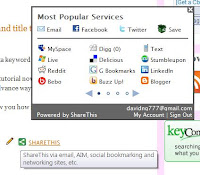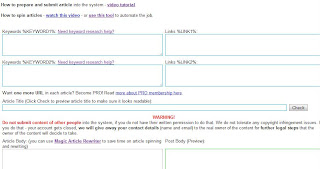Get Your Company Link Building With These 5 Simple TipsBy Oliver Feakins © 2009

As the online market place continues to warm up to the idea of SEO, link building has become center stage as it tends to be the most time consuming and crucial part of any internet marketing strategy. Link building services are the most commonly outsourced aspect of SEO. This process involves finding qualified and thematically relevant one-way linking partners who will link back to your website.
At first glance this sounds easy and there are hundreds of automated products out there that claim to add thousands of back links overnight. The truth is there are no short cuts in cultivating authoritative back links for a site. Link building companies spend many hours link building by hand in order to get the best results. Spammy automated products often don't cultivate valuable links and tend to do more harm than good. Here are a couple quick suggestions to help you get started.
1. Know What Keywords You're Targeting
Link building strategies are an extension of your current SEO practice. You'll want to reference the list of keywords you have selected to optimize your site. Make sure that the anchor text of the link has the keyword you are targeting. For example, if you're targeting the keyword "baby names" you'll want to place that keyword in the anchor text of the link. I've seen many companies go after links by using their company name. Although this does boost link popularity it fails to pass popularity for a specific keyword and can be seen as a failed attempt.
2. Develop a Link Building Strategy
There are many strategies link building companies use to source qualified back links to their clients. The most tedious but often most rewarding method is manual linking requests also known as "cherry picking". This method allows you to obtain exceptionally qualified links which can really help boost your position in the search engine results page (SERPS). A good place to start with manual link building is to look at your suppliers, vendors, clients, related organizations associations and more.
Besides manual link requests other well known tactics include:
1. directory submission (Dmoz, Yahoo Directory, Joe Ant)
2. article submission (ezinearticles.com, goarticles.com)
3. optimized press releases (PRWeb.com)
4. social media outlets (FaceBook, Linked In)
5. bookmarking sites (Digg, Reddit, Furl)
6. Blogs (niche blogs)
7. Forums (niche forums)
8. Classifieds (niche classifieds)
3. Identify Thematically Relevant and Authoritative Linking Sources
Search engines see links as votes of confidence for your site. The more relevant and authoritative the site, the more consideration is given to the link and the subsequent keyword in the anchor text. It really pays off to focus on the quality of your links rather than the quantity. It is also important for your link building to look natural and not an attempt to deceive search engine spiders in search of links. Try looking for sites within your industry rather than general, unrelated sites to get links from.
A good example of this would be content creation and distribution. Try creating content on a relevant subject of which you can speak authoritatively. An example of this would be a SEO company writing a short article on 5 simple ways companies can start link building and placing it on an authoritative, industry relevant site like this one. Remember, before placing a link on a site (or making a request), ask yourself three questions:
1. Does a link to my website belong here (does it look natural)?
2. Is this site relevant and authoritative?
3. Is there any benefit to my potential customers?
4. Look for the onsite attributes of the linking site
4. Determine Where Your Link Will Reside
Once you've nailed down a potential linking partner that represents the overall quality and thematic authority that your site deserves you'll need to see where your link will reside.
Here are a couple guidelines that I look for when placing links on a site. I try to get my links no more than a few clicks away from the homepage. The page must be thematically relevant and recently cached by Google's search engine (this lets me know that the page has been indexed by Google). I also take a look at the number of external (outbound) links leaving that page. I try to keep the number of external links below 50 as it will dilute the effect of the page. Lastly, I look at the page the link will be placed on. For some sites this is harder to control, but if you have the option you should know where the most valuable locations are. I always try to get my links in line with thematically relevant content, like an article or blog post. I've found this produces some of the best results. Try to avoid placing your links on a "sponsored" or advertisers section that runs throughout the entire site. Also avoid footer links as rumor has it Google has devalued links buried in the footer of the site. Links placed at the top of the page or inserted into the site's navigation also tend to do quite well. Bottom line is that your links need to look like they belong and provide value to the user and the site it is published on.
5. Be Aware of "No-Follow" Links
Within the last 5 years Google developed the concept of the "no-follow" link. The "no-follow" code is inserted into your link and instructs the Google spider to ignore it. The "no-follow" link can be seen used most commonly in blog comments and forum posts. This initiative was set forth to combat spam and automated linking mechanisms that would throw links automatically on blog comments and forum posts.
There are a lot of SEO professionals that will only place a link if it is a "do-follow" link, meaning it doesn't have the "no-follow" attribute. I tend to disagree with this notion especially when the link in question is on a highly trafficked authority site. If it makes sense for the link to be there, then add your link. Even though Google won't give you any credít for it, it will be seen by thousands of people who may visit your site and link to you themselves because your site is highly relevant. I call this concept indirect link building. You are influencing and promoting your site to potential linking partners.
Link Building is a very time consuming process and link building companies spend a lot of time researching, testing and improving their techniques. Link building services are available for companies that don't have the time to invest in manual link building. The bottom line is that with a little help anyone can link build and move their site up the SERPS.
About The Author
Oliver Feakins is the owner of WebTalent, a full service SEO company offering internet marketing services nationwide. Oliver is a frequent speaker at industry conferences as well as regional colleges and universities. He also writes for MarketingProfs.com, WebProNews.com, Social Media Today, ITworld and more. For more information on WebTalent visit www.webtalentseo.com. Its important to build your own css list if you are planning to design your website by yourself in the future. It might take few months or a year, as you can never do it within a day.
Its important to build your own css list if you are planning to design your website by yourself in the future. It might take few months or a year, as you can never do it within a day.















































